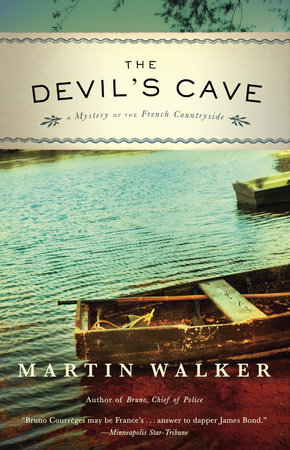Reading Group Center
- Home •
- Books by Category •
- Imprints •
- News •
- Videos •
- Media Center •
- Reading Group Center
The Devil's Cave
By Martin Walker
1. What makes Bruno such a likable protagonist? What are his most appealing qualities? What attributes help make him such a good detective? In what sense is Bruno a hero?
2. Early in the novel, Father Sentout, worried that the dead woman found in a boat has been the victim of a Satanism, asserts “They are forever at war within us, God and Satan, and our souls are never in greater danger than when we forget that” [p. 72]. Does the novel bear out his belief in this inner conflict between good and evil? Or are the crimes the novel explores simply a matter of greed and lust, which can be explained in purely secular terms?
3. After Junot’s suspicious death, Bruno acknowledges that “If he had a murder, or even two, he had no obvious motive for either one. He had some proof and plenty of suspects but no chain of logic to bind them together into any kind of coherent explanation for the deaths of Athénaïs and Junot, let alone connect them” [p. 256]. How does Bruno get from this state of almost total bafflement to solving the murders? What is the chain of logic that connects the murders?
4. Though The Devil’s Cave is at times a fast-paced thriller, it frequently slows down and luxuriates in the details of daily life in the small town of St. Denis. What do the many passages about cooking, horses, basset hounds, and so on, as well as Bruno’s romantic life, add to the novel?
5. How is Bruno regarded by the community of St. Denis he serves? How does he regard his role in that community?
6. When Bruno confronts Junot about the claim of wifebeating, Junot attacks him. Most policemen or detectives would have hauled Junot off to jail immediately. Instead, Bruno helps him get his tractor started. What does this encounter reveal about Bruno?
7. The theme of violence against women runs throughout the novel. What forms of ill treatment and exploitation of women does the novel explore?
8. When Bruno first encounters Eugénie, he observes that some would have thought her beautiful, with her perfect features and ivory complexion. “But there was a lack of animation or perhaps too much self-control in her face,” he says [p. 51]. What else does Bruno notice about Eugénie that makes him wary of her? How do Bruno’s very subtle powers of observation serve him as a detective?
9. Why does Isabelle choose not to stay in St. Denis and make a life with Bruno? Why is Bruno unwilling to go to Paris to be with her? Would Bruno be a less appealing character if he were married?
10. When Bruno realizes he can use the photographer Delaron for his own purposes—to get the newspaper to investigate the links between the vacation village and Gaston Lemontin’s file on Thivion—he reflects that he likes “solutions where everyone seemed to win” [p. 156]. What does this passage reveal about Bruno’s motivations and overriding concerns? Is he able to find “solutions where everyone seemed to win” in The Devil’s Cave?
11. In what ways does Bruno’s army training help him in the final, explosive encounter in the Devil’s Cave? Why does he fight so hard to save the count’s life?
12. Bruno doesn’t rely on DNA and other forms of forensic evidence to solve crimes, as so many modern police forces and detectives do. What does he rely upon instead?
13. The criminals in The Devil’s Cave are motivated by the age-old desires for money and power, but in what ways is the novel a reflection of our own unique historical moment? What role do real estate scams, shady investment firms, pornography, tourism, and media manipulation play in the novel?
14. A character like the Red Countess, an aristocratic Communist who was a courier in the French Resistance, could exist only in France. In what other ways is The Devil’s Cave a distinctly French novel? How does it differ from popular American or Swedish mysteries?
15. Martin Walker is also a journalist who writes a weekly column, “Walker’s World,” on international affairs. In what ways is The Devil’s Cave not only a highly enjoyable detective novel but also a serious commentary on our time?


